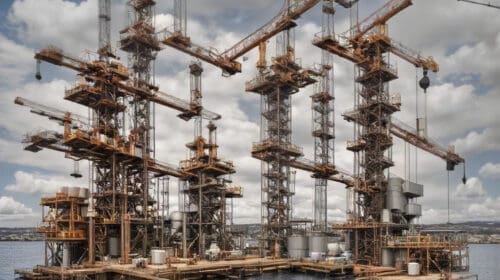Emmanuel Sullivan: Tell us a little about your current (or latest) position, what you do, and how you found your job.
Babatunde Deniga: I am currently the Reservoir Performance Project Coordinator for one of the world’s largest energy service companies. In this position, I apply my expertise in petroleum engineering management by developing and implementing cutting-edge technology, tools, and techniques for production optimization through sand control completions and stimulation measures.
This is a dual technical and project management role in which I am responsible for the design, planning, execution, and closure of sand control and stimulation projects across West Africa. My responsibilities include reviewing and approving all designs prior to execution, planning people and asset movement across borders for remote location operations, and overseeing execution as per approved design and applicable standards.
In 2009, I applied for a field engineer position and was selected. After passing the aptitude testing, I was one of three successful candidates, following a rigorous, full-day career evaluation session that included a team project, an individual engineering assignment, and a personal interview. Since starting my career as a field engineer in 2010, it has been a very worthy experience.
ES: What inspired you to start an oil and gas industry career? How did you decide on becoming a petroleum engineer/geoscientist, etc.?
BD: I am curious by nature. I naturally yearn to understand how things work, and this was the most basic quality that steered me to a STEM-based foundation. As I went through senior high school, I found my most enjoyable experiences were with chemicals and learning about the chemistry of things. This interest, coupled with career prospects in the burgeoning energy sector in Nigeria, helped me zero in on Petroleum Engineering as my career of choice. As an undergraduate at the University of Lagos, especially while serving as the Society of Petroleum Engineers (SPE) student chapter president, I was exposed to many industry professionals and was inspired by the technical expertise and sheer level of innovation ongoing in their workspace. This reinforced my desire to pursue a career in the oil and gas industry.
ES: You often meet workers in industry who do not have a formal college degree, but in your case how valuable was it to get the university experience?
BD: My formal education was foundational to my start in the industry. After receiving my B.Sc. degree in Petroleum and Gas Engineering, I earned my M.Sc. degree in Petroleum Engineering at Heriot Watt University in Edinburgh (UK). The university stimulated analytical thinking and problem-solving skills, which are extremely valuable and serve me very well in this career. Regardless of formal education, what I find most valuable today is mindset—having the willingness and ability to learn and unlearn as you gain more experience. This industry relies heavily on innovation, and to be successful, you must be committed to continuous improvement in your technical and interpersonal skills, otherwise, you will be left behind.
ES: How did you transition from the academic environment to the industry/corporate? What would you tell people who are about to make such a transition?
BD: I found the transition into the industry seamless. The first few years included advanced intensive trainings that were a level up from school to bring me up to speed with current day technologies. As I gained more experience, softer skills and management trainings helped me to advance my career development, and this is ongoing. The industry, and particularly my employer, is a structured embodiment of learning and cutting-edge technology, so you never stop learning new things. My advice for the future generation is to be open to a career of learning, as we currently exist in a fast-paced world of change.
ES: Has the industry taken initiatives to transition young professionals into the oil sector smoothly? What, if anything, could be done better?
BD: The industry is constantly evolving. These days, social media is an effective way of connecting with young people and piquing their interest in the industry. Keeping young professionals engaged with a well-structured career plan makes for seamless transitions. This has been my personal experience and remains an effective strategy.
ES: The O&G industry has many conferences and events – have you attended any of them? If so, how useful do you find them and what’s your takeaway?
BD: I have attended multiple conferences including NAICE and NAPE, starting from my days as SPE student president, and continue to attend and participate whenever my schedule allows. I have found industry events to be informative, educational, and technology-driven. My takeaway is that innovation is the key to getting ahead and staying ahead.
ES: If you communicate with students regularly, do you think there’s an increased or decreased interest among youngsters to have a career in the O&G industry compared to the past?
BD: I do interact with undergraduates and young professionals on a regular basis. I have been an SPE e-mentor for over a decade, and in that time, I have not observed a waning interest in the oil and gas industry. Outside of SPE interactions, I am regularly contacted by university students on LinkedIn who are seeking some form of mentorship, so from my experience, I believe the interest in O&G careers remains strong.
ES: What advice do you give students interested in the oil and gas industry? Should they pursue a career during these constant downturns?
BD: I tell students to be agile in your thinking, build competencies, and always aim to improve yourself. This way you will always land on your feet. Oil and gas are still the main sources of energy to date, and for the near future. But the energy industry is no longer singularly focused on oil and gas, diversification of the energy portfolio is currently ongoing. The transition to and emergence of other forms of sustainable energy is really gathering momentum, so there is a place for every capable hand.
ES: What main technical skills will be needed for the industry in the near term based on your previous experience?
BD: In terms of technical skills, digital integration will be most important. Solid engineering skills are a basic requirement, and in my experience, efficiency in our operations drives sustainability and profitability. Digital integration is the next level of operational efficiency.
ES: What would you like to learn in the near future from experienced people who are in their mid-to-late careers?
BD: I would like to learn more about strategic business management. The COVID-19 situation threw the industry a once-in-a-generation curve that some companies did not anticipate and did not survive. I observed that the most resilient organizations were those with a paranoid and strategic mindset as to the management of their organizations. This is why I have pursued advanced project management education and experience throughout my career—to ensure that I am always attuned to technological developments and applications through the lens of business productivity and profitability. This approach adds value to my employer and our clients.
The CEO of U.S. Energy Media, Emmanuel Sullivan is a technical writer who has built up his profile in the oil and gas industry. He lives and works in Houston, where he publishes Oilman and Oilwoman on a bimonthly basis, and Energies quarterly, distributing the magazine to energy thought leaders and professionals throughout the United States and around the world. At a time when technology is rapidly changing, he provides an invaluable service to oil & gas, and renewable energy executives, engineers, and managers, offering them both broad and specific looks at the topics that affect their livelihoods. Sullivan earned his BA in Communications at Thomas Edison State University and his MA in Professional Writing at Chatham University.
Oil and gas operations are commonly found in remote locations far from company headquarters. Now, it's possible to monitor pump operations, collate and analyze seismic data, and track employees around the world from almost anywhere. Whether employees are in the office or in the field, the internet and related applications enable a greater multidirectional flow of information – and control – than ever before.







